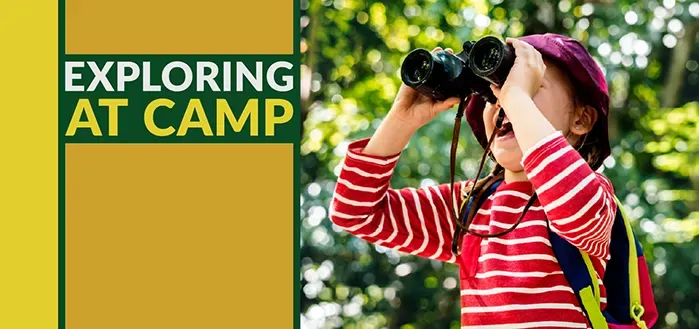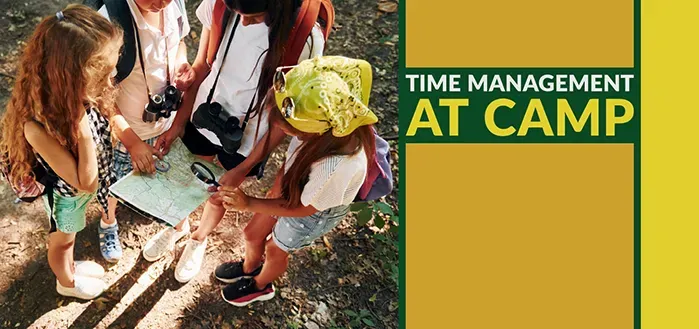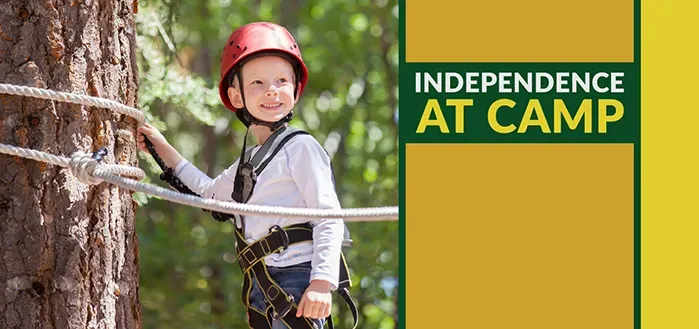6 Ways Children Practice Independence at Camp
August 1, 2024
Summer camp is more than just a fun getaway for kids—it's an exciting adventure that transforms them into confident, independent individuals. As camp professionals, you already see firsthand the incredible impact these programs have on young minds. To help you convey this to potential camp families, we’ve compiled a list of six key ways summer camp builds a child’s independence.
Forms of Independence Experienced at Camp
Independence is a state of being free from outside control and not relying on another’s authority. While children rarely experience full independence, practicing it in different forms is crucial for their development.
Let's focus on six key ways to explore independence at camp:
💭 Intellectual or Cognitive
– This form focuses on independent decision-making and problem-solving. After all, campers are typically away from home and familiar environments.
🚶Physical, Visual and Spatial
– This form involves the individual learning how to safely and successfully move through different environments and their unique challenges. For campers with certain health concerns impacting their mobility, this can be a critical form of independence to practice during early years of development.
⌚Time
– This form of independence focuses on an individual’s awareness and their ability to perceive the flow of time, estimate the time that tasks will take, and prioritize how time is spent by developing personal schedules or habits.
👥 Social
– This form relates to one’s ability to enter, exit, and navigate complex social interactions. This could include social behaviors such as making introductions, responding to criticism or authority, adapting to new social groups or situations, sharing personal experiences, or engaging in meaningful discussions.
👔 Personal
– This form involves practicing the ability to take care of one’s basic and complex needs as an individual. Basic personal needs can be items related to hygiene, nutrition, or safety. Meanwhile, some examples of more complex personal needs are the ability to set goals or aspirations, develop plans to achieve them, and holding oneself responsible for taking action.
💰 Financial
– This form of independence relates to the ability to perceive value, work to attain money, spend money wisely, create budgets, and more! For younger campers or camps which do not want to emphasize money, a point system can easily replace currency for the same types of lessons.

How to Explore Different Types of Independence with Campers
Children can practice these six types of independence within one fun and interactive camp experience. Keep reading to discover examples of how kids develop these important skills at camp.
Practicing Intellectual or Cognitive Independence at Camp
Developing this type of independence relies on practicing logic and observation. Campers regularly make decisions and solve problems at camp, whether it’s choosing which activities to participate in, working in groups, evaluating meal options, or establishing daily routines (such as what to wear, when to clean up, etc.).
Exploring Physical, Visual and Spatial Independence at Camp
From the moment they arrive at camp, children practice this form of independence. Navigating new spaces, facilities, and tools—such as shared lockers, bunks, cabin space, and activity equipment—can take time and patience. Learning new physical skills such as swimming, climbing, or hiking may also be necessary for success at camp, which may be activities or challenges outside of what is explored at home.
Learning Time Independence at Camp
Campers arrive with varying capacities for adhering to schedules or “spending time wisely.” Learning about time management can be as simple as setting aside adequate time to get ready in the mornings and take care of hygiene. It could also involve planning the appropriate amount of time to move between activities and get-togethers, or taking on leadership roles that require careful management of unscheduled time at camp.

Navigating Social Independence at Camp
Camp presents numerous social challenges—from learning names and faces to understanding different cultures and traditions. Successfully interacting with new people, finding common ground, and forming friendships are among the biggest takeaways from the camp experience.
Growing Personal Independence at Camp
Another significant benefit of camp is the opportunity for campers to learn new things about themselves. Without the usual influence of familiar adults, family members, and friends at home, campers must care for themselves in new ways, introduce themselves to others, and set their own goals and priorities for their time at camp. Do they want to make new friends? Prioritize learning new skills? Their actions will directly influence the outcome.
Concepts of Financial Independence at Camp
Using a point system where campers can earn points for their actions and then redeem points for certain items or privileges, can help camps navigate lessons about financial independence without the risks involved with campers storing or spending money. For camps that want to offer extra spending opportunities to campers for treats, gift shop items, or extra camp essentials, campers can learn how to manage money, too. Whether the funds come from a camp program for good behavior or are provided by guardians using a camp spending account... learning to budget, plan, and save for desired items is a valuable lesson in financial independence.
Discussing the Value of Camp with Families
Summer camp is a powerful tool to help build a child's independence and other essential life skills. Sure, camp leaders and organizations know this. But do your camp families know it? Camp is far more than an alternative to childcare in the summer and around holidays. It’s a chance for campers to have a transformative experience!
By fostering decision-making skills, promoting social interactions, encouraging responsibility, boosting confidence, and nurturing resilience, camps provide children with many of the essential experiences they need to grow into self-reliant and confident individuals. When speaking with parents and guardians about the benefits of camp, make a point of highlighting the profound impact camp can have on developing a child's independence
Get Creative with Your Camp's Storytelling!
There are many ways to inform camp families about the benefits of camp: social media posts, direct emails, informational sheets, a video interview of past camp families about their child becoming more independent after camp, written testimonials (from families and campers), camper opinion surveys, and more!
About iCampPro
iCampPro can help your camp streamline operations and enhance the camp experience from sign-up to sundown! With great features like built-in email scheduling, seasonal staffing tools, health tracking, and ongoing enhancements...we invite you to find out why iCampPro is the best camp management software for overnight, day and family camps!
About the Author
Her love for camp life started young, spending summers at overnight and 4-H day camps where she discovered a lifelong appreciation for creativity, exploration, and community. Today, Brittany brings that same energy to iCampPro, crafting thoughtful, engaging content that speaks to the heart of camp professionals and empowers them to do what they do best.











